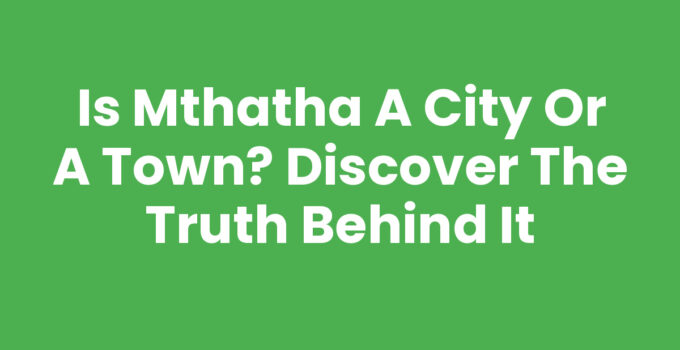Mthatha, a place imbued with rich historical and cultural significance, is often a subject of debate when it comes to its classification as a city or a town. Nestled in the Eastern Cape of South Africa, Mthatha is a vibrant community that encompasses a blend of urban and rural characteristics. In this blog post, we will delve into the complexities of Mthatha’s identity, explore its features, and provide clarity on whether it should be regarded as a city or a town.
Is Mthatha A City Or A Town?
To answer the question, “Is Mthatha a city or a town?” we must explore various facets of its development, governance, and community structure. The designation of a place as a city or a town often depends on its population size, infrastructure, economic activity, and administrative framework.
Mthatha was formerly known as Umtata and was established as a district in the late 19th century. The area gained municipal status in the 20th century and underwent significant transformations over the years. Here are key points to consider:
- Population: Mthatha is one of the largest towns in the Eastern Cape, boasting a population that hovers around 100,000 residents. This population size suggests characteristics of a city.
- Infrastructure: The town features urban amenities such as schools, hospitals, shopping centers, and transport links, which are indicative of a city structure.
- Governance: Mthatha is governed by the King Sabata Dalindyebo Local Municipality. The presence of a municipal government designed to cater to a broad range of urban needs reinforces its identity beyond that of a traditional town.
- Cultural Significance: Mthatha holds cultural importance as the heart of the Xhosa nation and is the traditional capital of the former Transkei region.
Ultimately, while Mthatha is officially categorized as a town, its characteristics, such as governance, population, and infrastructure, lend it the essence and functional characteristics of a city. Thus, for many discussions, Mthatha can comfortably straddle the identity of both a town and a city.
Further Reading: Delight in Traditional Xhosa Food Tasting Mthatha Experience
Cultural and Economic Significance of Mthatha
Regardless of its classification, Mthatha plays a pivotal role in the cultural and economic fabric of South Africa. Historically, it was known as the site of the funeral of the late Nelson Mandela, and it continues to be a focal point for tourism and commerce.
The economic activities in Mthatha range from traditional agriculture to more modern business practices. The town is also known for attracting entrepreneurs and investors, given its strategic location and access to various resources. Here’s a closer look at Mthatha’s cultural and economic significance:
- Arts and Crafts: Mthatha is known for its vibrant arts scene, including traditional craft markets where local artisans sell handmade goods.
- Tourism: Attractions such as the Nelson Mandela Museum and the nearby Wild Coast region draw visitors to Mthatha.
- Educational Institutions: The town is home to the Walter Sisulu University, contributing to higher education and workforce development.
Mthatha’s unique combination of cultural heritage and economic potential makes it a significant hub in the Eastern Cape region, further blurring the lines of its classification.
You Might Also Like: Traveling from Mthatha To Coffee Bay: A Complete Guide
Living in Mthatha: Pros and Cons
When contemplating a move or a visit to Mthatha, it is vital to weigh the pros and cons of living in this unique town.
Pros:
- Community Feel: Mthatha boasts a tight-knit community where residents often come together for cultural events and celebrations.
- Cost of Living: The cost of living in Mthatha can be lower compared to larger metropolitan areas, making it an attractive option for many families.
- Heritage and Culture: The various cultural practices and traditions in Mthatha provide a rich living experience.
Cons:
- Job Opportunities: While there are economic activities, job opportunities can be limited compared to larger cities.
- Infrastructure Challenges: While Mthatha has urban features, some areas may experience inadequate public services.
- Healthcare Access: Access to comprehensive healthcare services may be limited compared to larger cities.
Overall, while Mthatha presents both opportunities and challenges, its historical and cultural significance remains unquestionable. Whether one views it as a town or a city, Mthatha provides a dynamic environment for residents and visitors alike.
See Also: Is Mthatha Cold In Winter? A Complete Weather Guide
Conclusion
In conclusion, while the classification of Mthatha as a city or a town can be nuanced, it reflects a rich tapestry of culture, history, and community. As we have examined, Mthatha stands out for its population density, significant infrastructure, and cultural importance, allowing it to be a place with characteristics of both a town and a city. By exploring its unique features, we gain a deeper understanding of Mthatha’s role in South Africa’s broader social and economic context.
Related Guide: How Safe Is Mthatha – Find Out If Mthatha Is Safe For Tourists In 2025
Frequently Asked Questions
What is the history of Mthatha?
Mthatha has a rich history, being established as a district in the late 19th century and serving as a cultural hub for the Xhosa nation.
What are the main attractions in Mthatha?
Main attractions include the Nelson Mandela Museum and local craft markets, showcasing the region's cultural heritage.
Is Mthatha safe to live in?
Like many towns, Mthatha has areas with varying safety levels. It is advisable to research neighborhoods and stay informed about local conditions.









